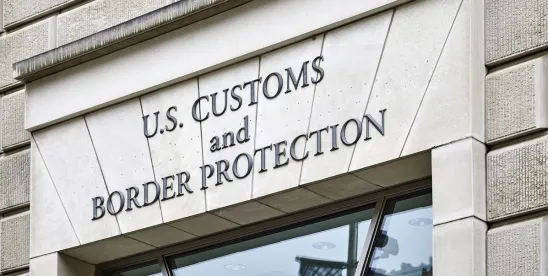As detailed in our prior article on “What Every Multinational Company Should Know About … The Rising Risk of Customs False Claims Act Actions in the Trump Administration,” the Department of Justice (DOJ) is encouraging the use of False Claims Act (FCA) claims to address the underpayment of tariffs by importers. In addition, many of President Trump’s new tariff proclamations have directed Customs to prioritize enforcing the new tariffs while also stating that Customs should assess the maximum penalties for underpayments without considering any mitigating factors. This article is the first in a series that highlights the heightened risks of importing in a high-tariff, high-penalty environment based on a comprehensive review of all prior FCA enforcement actions based on underpayment of tariffs.
As detailed in other articles in this “What Every Multinational Company Should Know” series, Customs has full access to electronic data from every importer for every entry through the Automated Commercial Environment (ACE) portal. This gives Customs the ability to run sophisticated algorithms, to find anomalies and ferret out potential underpayments. This includes comparing importers’ import patterns and entry-specific information (valuation, country of origin, etc.) not only against their own prior entries but also those of competitors bringing in similar merchandise. Much of this data also is available publicly, and the FCA permits private relators to file qui tam suits in the government’s name. The end result is that Customs and relators have the unparalleled ability to find underpaid tariffs.
There are five elements working to create a sharply increased risk profile for importers:
- Heightened tariff levels, which make it possible to run up tariff underpayments and associated penalties very quickly.
- Customs’ increased attention to tariff underpayments, particularly for the new Trump tariffs.
- The threatened use of alternative enforcement tools on top of normal Customs penalty procedures, including the FCA and potential criminal penalties.
- The increasing incentives for employees, competitors, and other potential relators to become whistleblowers.
- The enhanced ability of Customs and plaintiff law firms to target and identify tariff underpayments.
The Customs enforcement and FCA risks are especially high for declaring the correct country of origin. This risk is encapsulated by the March 25, 2025 settlement of a Customs FCA action for $8.1 million. According to the DOJ, the importer misrepresented the country of origin of certain wood flooring imports by declaring them to be a product of Malaysia instead of the proper country of China, thereby paying the far-lower tariff rates levied on products of Malaysia.
Several aspects of this settlement are especially notable in the current high-tariff environment:
- The underlying qui tamcomplaint did not contain specific evidence of scienter beyond the allegedly inaccurate statements on customs documents, although the government’s investigation likely uncovered such evidence because the FCA requires that false statements be made “knowingly.”
- The settlement amount was based on unpaid duties from three different types of tariffs: antidumping duties, countervailing duties, and section 301 tariffs, all of which simultaneously applied to imports of wood flooring manufactured in China. While this type of multiple-tariff importation used to be rare, many of the new tariffs announced by the Trump administration “stack,” which means it will be common for entered products to be subject to multiple tariff regimes. This increases the chances of errors quickly multiplying and creating a much higher risk exposure.
- In its press release, the DOJ highlighted the role that CBP played in the case, including how it made factory visits, detained shipments, analyzed import records, and conducted witness interviews. We expect this type of cooperation will become a regular feature of Customs FCA actions, as Customs has long-established expertise in identifying tariff underpayments.
- The settlement states that the relator was a competitor of the importer, which ended up receiving $1,215,000 of the settlement proceeds. This is a reminder that FCA risks can arise from employees, former employees, suppliers, competitors, or even customers who could file qui tam suits as relators. Further, because services exist that gather import-related data and sell it to the general public, all of these parties — or relator-side law firms — could data mine this information to look for opportunities to file qui tam actions in hopes of achieving a similar payday. This also serves as a reminder that it is important for importers to file manifest confidentiality requests every two years, to minimize the amount of such information released to the public.
- The allegations of underpaid duties were all related to the alleged failure to declare the correct country of origin. With the announcement of the new “reciprocal tariffs,” the country of origin generally will be the primary determinant of the amount of tariffs due. We accordingly expect Customs to focus heavily on whether importers are correctly declaring the country of origin, particularly when importers declare the country of origin to be low-tariff countries like the United Kingdom or Singapore.
Indeed, we expect that this specific fact pattern of misrepresenting the country of origin on goods will lead to numerous FCA actions. That fact pattern was present in one of the largest FCA cases, which resulted in the importer of printer ink paying $45 million in 2012 to resolve allegations that it misrepresented the country of origin on goods to evade antidumping and countervailing duties. In that settlement, the DOJ stated that although the printer ink “underwent a finishing process in Japan and Mexico before it was imported into the United States, the government alleged that this process was insufficient to constitute a substantial transformation to render these countries as the countries of origin.”
Preventing and Remediating Customs and FCA Enforcement Risk
The combination of increasing Customs FCA activity and sharply increasing tariff levels leads to the following corollaries that every importer should know:
- Corollary #1: In a high-tariff environment, errors in Customs compliance can lead to quickly mounting underpayments of tariffs, thereby sharply increasing the risk profile of acting as the importer of record.
- Corollary #2: In a high-tariff environment, Customs compliance is thus more important than ever.
- Corollary #3: In a high-penalty environment, the aggressive and consistent use of post-summary corrections to fix import-related errors before they become final is also more important than ever.
- Corollary #4: In an environment where Customs assesses penalties without considering mitigating factors, making voluntary self-disclosures is an essential tool to minimize Customs penalty risks, because Customs does not assess penalties for voluntarily disclosed conduct without analyzing aggravating and mitigating factors.
- Corollary #5: In an environment of enhanced FCA actions, taking steps to minimize the risk of qui tamrelators is essential for all tariff-related issues.
These realities and recent enforcement cases underscore the importance of importers carefully reviewing areas where Customs is focusing its enforcement attention, which undoubtedly will include any shipments from low-tariff countries in light of the global and reciprocal tariff announcement. If the third-country processing or manufacturing is not enough to support an argument that the inputs were substantially transformed into a product with a different name, character, or use, thereby essentially changing its identity, then the importer could be accused of making a false statement by declaring an improper country of origin.
In sum, the combination of the new high-tariff environment, the heightened ability of Customs (and the general public) to data mine, and the stated emphasis of the DOJ to focus on and encourage the use of the FCA substantially increases import-related risks. In subsequent articles, we will highlight additional areas where we see heightened enforcement risk so that importers can take proactive steps to avoid Customs and FCA penalties.








 />i
/>i

